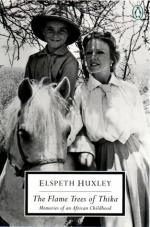
|
| Name: _________________________ | Period: ___________________ |
This test consists of 5 short answer questions, 10 short essay questions, and 1 (of 3) essay topics.
Short Answer Questions
1. What happened to the leopard caught in the trap?
2. What does the word "kali" mean?
3. What were Hereward and the Kikuyu hunting in Chapter 11?
4. On what had Elspeth cut her hand?
5. How much money did Tilly's sister send her?
Short Essay Questions
1. How did the Kikuyu deal with the suffering of animals?
2. How did the Kikuyu and Masai differ in their approaches to hunting?
3. Why were Tilly and Lettice suspicious of Mr. Roos' behavior toward Elspeth?
4. How did the Europeans view the difference between a bribe and a tip?
5. How did Elspeth view the planned hunt versus the actual hunt?
6. What did the Kikuyu do to preserve memories of the dead?
7. How did Ian justify the brutality of the Abyssinian leaders he encountered before coming to Africa?
8. Why were the other adults so upset at Mr. Roos for trapping the leopard?
9. Why did the Kikuyu distrust hyenas?
10. Why did Robin agree with the Italian priests in their refusal to baptize or help Njombo?
Essay Topics
Write an essay for ONE of the following topics:
Essay Topic 1
Pioneer Mary was known as a wild woman who in many ways behaved more like a man in Africa. She was both feared and respected by both Europeans and Africans. How was her personality shaped by her personal family tragedy (the loss of both her husband and two young children)? In what ways did her personality allow her to survive and thrive in an environment that could be hostile to a European, especially a woman in that day and age? Did her wildness contribute to her ability to thrive? How did she differ from most of the women around her? Was she happier than the others?
Essay Topic 2
Elspeth Huxley pointed out that the Kikuyu language did not have any words for "thank you" and that the Europeans therefore often accused them of ingratitude. Why did the Kikuyu lack the words to express gratitude? Were they truly lacking in gratitude? How important are words in expressing thanks? Did they seem to display gratitude toward one another? Was Elspeth perhaps right when she said the natives simply viewed the Europeans as different and therefore, not in need of thanks?
Essay Topic 3
Elspeth Huxley at one point said that the natives never stole from one another, but did not seem to have any qualms about stealing from the Europeans. Why was this the case? What forces prompted the natives to avoid stealing from one another? How did they seem to view the Europeans and why would they be willing to steal from them? Did they view the Europeans as neighbors and fellow villagers or as something else entirely?
|
This section contains 1,095 words (approx. 4 pages at 300 words per page) |

|




